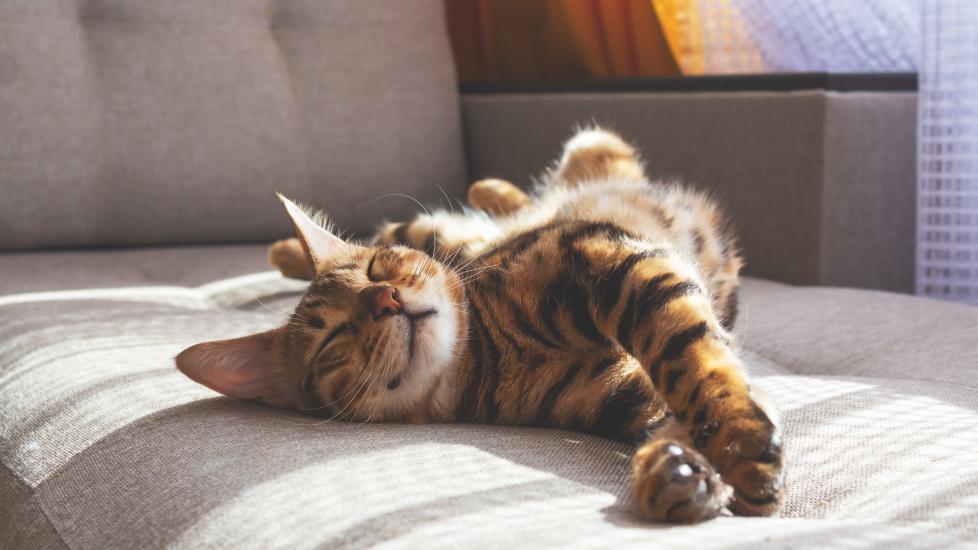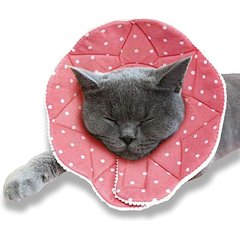False Pregnancy in Cats
What Is False Pregnancy in Cats?
Although common in dogs, false pregnancy is an uncommon condition in cats. Only females who have not had their reproductive organs removed during a spay surgery (ovariohysterectomy) can experience false pregnancy, which occurs during a specific time in their reproductive cycle.
To understand false pregnancy, one needs to know a bit about basic cat reproduction. Cats are seasonally polyestrous, which means they come into heat—the time when they are receptive to breeding—only during seasons with long daylight hours.
They repeatedly cycle every two to three weeks during this time, unless a pregnancy or false pregnancy interrupts the process. In North America, cats breed in spring, summer, and fall.
Cats are induced ovulators, which means they do not produce eggs automatically. A female cat’s ovaries release an egg only if she breeds with a male. If the egg is successfully fertilized, she becomes pregnant.
If not, a cat can experience a false pregnancy (pseudopregnancy). Hormonal changes during false pregnancy can make a cat appear and behave as though she were pregnant, even though she isn’t.
In most cases, a false pregnancy resolves without treatment. This condition is not an emergency, but you should speak with your veterinarian if you suspect your cat is experiencing either a pregnancy or a false pregnancy. Your vet will rule out a true pregnancy or other medical problem that could be causing your cat’s symptoms.
Symptoms of False Pregnancy in Cats
Cats rarely show signs of a false pregnancy. However, breeding cats frequently experience false pregnancies, which are considered normal in the breeding process.
Because most female pet cats in North America are spayed at a young age, a typical indoor cat is unlikely to experience a false pregnancy. Barn or community cats are the most likely to experience this condition. If you let your unspayed female cat go outdoors, she is at risk of becoming pregnant.
When a false pregnancy occurs, a cat’s symptoms mimic those of a true pregnancy. False pregnancy symptoms in cats include:
-
Weight gain
-
Distended abdomen
-
Licking the abdomen
-
Mammary development
-
Milk production
-
Nesting behavior
Causes of False Pregnancy in Cats
Cats can experience false pregnancy if they breed with a male and do not become pregnant. Changes in a female cat’s progesterone and prolactin levels—hormones associated with reproduction and pregnancy—play a role.
Also, some female cats may spontaneously ovulate, which can cause a false pregnancy even if they have not been around a male cat.
Only unspayed female cats can experience false pregnancy, but the condition can also theoretically occur a few days after spay surgery. This phenomenon is likely related to the sudden decrease in hormone levels after a veterinarian has removed a female cat’s reproductive organs.
How Veterinarians Diagnose False Pregnancy in Cats
To diagnose a false pregnancy, your veterinarian will ask you to provide your cat’s thorough medical history and to describe your female cat’s lifestyle, recent behavior, and contact with male cats.
Because pregnancy and false pregnancy may cause similar symptoms, your veterinarian will rule out a true pregnancy. Your vet may also want to exclude other reproductive conditions, such as a uterine infection (pyometra).
To determine the cause of your cat’s pregnancy symptoms, your veterinary team may perform one or more of the following tests:
-
Complete physical exam
-
Basic blood work
-
Blood hormone levels
-
Abdominal ultrasound
-
Abdominal X-rays
Treatment of False Pregnancy in Cats
False pregnancy in cats usually resolves without treatment. A vet won’t typically prescribe medications that alter hormone levels. This is because these drugs cause significant side effects, and false pregnancy isn’t usually harmful to the cat.
False pregnancy does not affect a cat’s fertility. If your cat experiences a false pregnancy, they can become pregnant or develop additional false pregnancies in the future. If you don’t want your cat to have kittens, having them spayed will prevent pregnancies.
Recovery and Management of False Pregnancy in Cats
Most false pregnancies last 40 to 50 days, until the cat begins a new estrus cycle. However, if your cat is showing signs of a false pregnancy, the signs will likely resolve within a few weeks.
If your cat experiences a false pregnancy, you can support their recovery by keeping them indoors, providing comfortable bedding, monitoring their appetite, and discouraging them from licking their belly.
A recovery collar or postsurgical onesie can help prevent licking. Avoid touching your cat’s mammary glands or letting her lick them, which can stimulate milk production.
Prevention of False Pregnancy in Cats
The best way to prevent your cat from having a false pregnancy is to have her spayed before her first heat cycle.
Most veterinarians recommend that cats undergo a spay procedure at around 5 to 6 months of age, although spaying later in life still provides benefits. A spay surgery prevents pregnancy and false pregnancy and also reduces your female cat’s risk for various cancers.
False Pregnancy in Cats FAQs
Can a spayed cat have a false pregnancy?
Only reproductively intact cats can develop a false pregnancy. If a female cat undergoes a spay procedure during a specific time in her reproductive cycle, she could develop a false pregnancy a few days later. After a spay procedure, false pregnancy is no longer possible.
Why does my cat appear to be pregnant even though she isn’t?
Cats may seem to be pregnant during a false pregnancy, but other conditions can also lead to symptoms such as weight gain, abdominal distention, or mammary gland enlargement.
Obesity, tumors, infections, and organ failure are potential causes. Speak with your vet if you notice any changes in your cat’s appearance.
What is the mammary gland discharge in a cat with a false pregnancy?
A false pregnancy elevates a cat’s prolactin level, which stimulates milk production. Your cat’s mammary glands may leak milky or watery secretions for several weeks, but symptoms usually resolve on their own.
To avoid further stimulating the production of milk, do not “milk” your cat or allow her to lick her mammary area.
Featured Image: Anna Derzhina/iStock / Getty Images Plus via Getty Images



